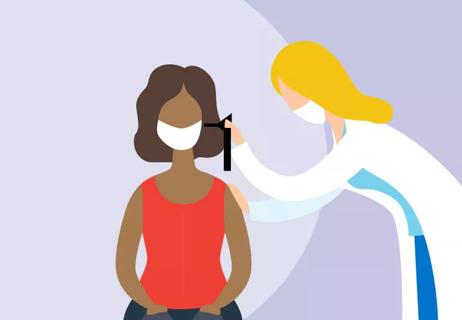COVID-19 may be associated with tinnitus, but research is still ongoing

If you experience tinnitus, you know it can be a real distraction. According to the American Tinnitus Association( ATA), “Tinnitus is the perception of sound when no actual external noise is present.”
Advertisement
Cleveland Clinic is a non-profit academic medical center. Advertising on our site helps support our mission. We do not endorse non-Cleveland Clinic products or services. Policy
Tinnitus can be perceived in a variety of ways, including ringing, buzzing, hissing, crickets and more. It can happen in either one or both ears. It can be constant. Or it can come and go.
Tinnitus affects more than 25 million people in the United States. And some people report that it starts or worsens following a COVID-19 infection.
What do we know about COVID-19 and tinnitus?
Audiologist Sarah Ruwe, AuD, helps us gain a better understanding of what tinnitus is and how to find relief.
Reports started emerging early in the pandemic of people noticing tinnitus, vertigo and other auditory symptoms after having COVID-19.
Research on the connection is ongoing, but there’s evidence to back up the idea that people may become aware of tinnitus following a COVID-19 infection.
A 2021 systemic review conducted by The University of Manchester and Manchester Biomedical Research Centre suggests up to 14.8% of people infected with COVID-19 reported experiencing tinnitus.
Of note, this review also states this could be an overestimation. That’s because the studies involved didn’t specify whether participants were reporting new tinnitus symptoms or an increase in tinnitus symptoms.
A more recent research study suggests COVID-19 infection may increase the severity of tinnitus in people who were already living with the condition. However, the scientists don’t know whether COVID-19 necessarily caused the tinnitus or if there were other explanations for the conditions to overlap.
Advertisement
“Any upper respiratory illness can make patients more aware of underlying hearing loss or tinnitus, as in these cases, we are paying closer attention to our sinus and other related head and neck systems,” Dr. Ruwe shares.
“For patients who have either longstanding or bothersome tinnitus, we would recommend scheduling a comprehensive hearing test as the first step in better understanding this concern.”
In other words, it’s possible you may first notice tinnitus following a COVID-19 infection. But there are many other reasons you may experience ringing in your ears. More on that in a bit.
COVID-19 and other upper-respiratory illnesses can cause temporary blockage or a muffled sensation in our hearing. And as tinnitus is a symptom of a change in hearing, we can notice tinnitus during these times as well. As your hearing recovers, the tinnitus often subsides.
While the scientific community still doesn’t have a complete understanding of tinnitus, audiologists and other professionals working with tinnitus — including neurologists and dentists — often compare it to when someone loses a limb and experiences phantom limb syndrome.
“Your brain is used to a certain amount of sound stimulation, and with a change in hearing, the brain is now receiving less auditory stimulation than it was before. However, your brain still wants to continue firing at the rate it always has,” Dr. Ruwe explains. “This change can lead to spontaneous neural firing where no stimulus for that firing is present. This is what we perceive as tinnitus.”
Researchers say that tinnitus associated with COVID-19 infection hasn’t been shown to present itself any differently from tinnitus that’s unrelated to COVID-19.
But the way that people experience tinnitus — whether as a side effect of COVID-19 or not — can vary.
Tinnitus is commonly experienced as a ringing in your ear, but it can also take other forms.
“Tinnitus can take the form of many sound percepts. Some patients report ringing, roaring, buzzing, hissing, whooshing, crickets and more,” Dr. Ruwe notes. “Many patients may even experience more than one sound.”
In short, tinnitus is any kind of sound that you perceive when there isn’t an actual sound there.
There have been some, limited, reports of people who say they started experiencing tinnitus after getting vaccinated for COVID-19. But research hasn’t found a connection between the COVID-19 vaccine and tinnitus at this time.
Typically, tinnitus associated with an upper-respiratory infection resolves as people recover from the infection. But there have been reports of people experiencing tinnitus for several months after an infection. Other people have reported they continue to perceive tinnitus after they’ve fully recovered from COVID-19 symptoms.
Advertisement
Some people find that the use of sound therapy can provide relief from tinnitus. Easy ways to utilize therapeutic sounds at home can include running a fan, humidifier or white noise machine. Other people prefer nature sounds or ambient soundscapes. You can look for playlists online or download sound therapy apps on your phone.
If the ringing in your ears is interfering with your life, scheduling an appointment with an audiologist is recommended.
Tinnitus is a symptom, not a diagnosis. So, the best way to help your tinnitus is to find and treat the source. Audiologists can identify tinnitus related to the hearing system or refer you to other medical providers for tinnitus related to other causes. Audiologists can also help with tinnitus management strategies.
It’s important to remember that just because you might notice tinnitus following a COVID-19 infection, it doesn’t mean that COVID-19 caused your tinnitus.
In addition to hearing loss, tinnitus can be related to a number of conditions, including:
Tinnitus can also be a side effect of some medications. Knowing the root cause of your tinnitus can help you best manage it.
Advertisement
Dr. Ruwe says any sudden changes in your hearing should be addressed quickly by an otolaryngologist or otologist (physicians who specialize in conditions of the ears, nose and throat).
“If you perceive a sudden change in your hearing, it is essential to address this concern as soon as possible,” she stresses. “For patients who experience what is called a sudden sensorineural hearing loss (an unexplained, rapid loss of hearing), treatment is most effective within three days of the onset.”
For people who have a gradual or longstanding hearing or tinnitus concern, scheduling an appointment for a hearing test is the best place to start.
And when it comes to treating and managing tinnitus, the main thing to keep in mind is some many techniques and strategies can reduce your tinnitus over time.
“Tinnitus isn’t something that you just have to live with,” Dr. Ruwe reassures. “There’s help available. It’s important to reach out — not only so that we can identify and treat the potential cause, but also so we can assist you with the most effective ways to cope with or manage your tinnitus.”
Advertisement

Sign up for our Health Essentials emails for expert guidance on nutrition, fitness, sleep, skin care and more.
Learn more about our editorial process.
Advertisement

Understand the symptoms and find relief

Chilblain-like skin lesions and rashes are mild (and rare) complications of many viral infections, not just COVID-19

Yes, but symptoms can be easy to miss

‘Walking pneumonia’ is milder and doesn’t always require medication — but it’s also highly contagious

Follow these tips, like hand washing and self-care, to keep illness at bay as you celebrate the season

From washing your hands and disinfecting surfaces to boosting your immune health, there are many ways to reduce your flu risk

Most can return to work or school when they’re symptom-free for 24 hours

Routine screenings at school are normal and important

Even small moments of time outdoors can help reduce stress, boost mood and restore a sense of calm

A correct prescription helps your eyes see clearly — but as natural changes occur, you may need stronger or different eyeglasses

Both are medical emergencies, but they are very distinct events with different causes